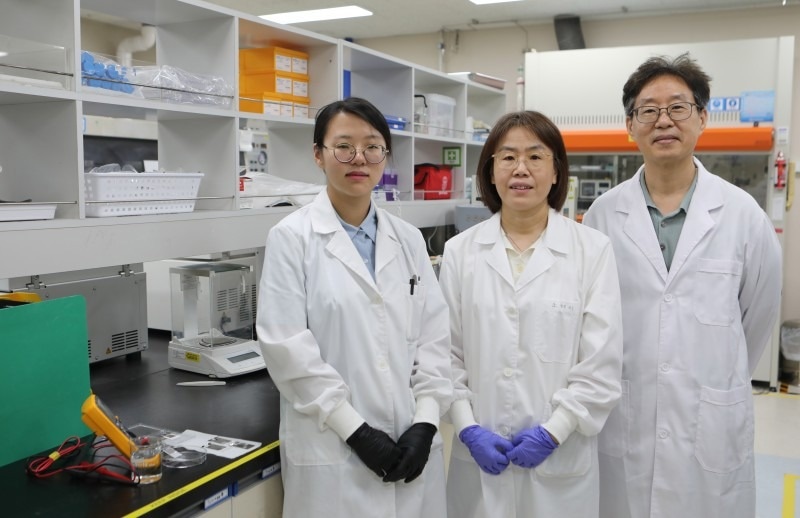Reviewed by Danielle Ellis, B.Sc.Sep 11 2024
According to a study published in Chemical Engineering Journal, a research team led by Principal Researcher Seungmin Hyun and Senior Researcher Hye-Mi So of the Department of Nano-devices and Displays of the Nano-convergence Manufacturing Research Division of the Korea Institute of Machinery and Materials, an institute under the jurisdiction of the Ministry of Science and ICT, and Professor Soo-Hwan Jeong of the Department of Chemical Engineering at Kyungpook National University (President Won-hwa Hong) was successful in inventing an environmentally friendly self-charging energy harvester that can be used to generate electrical energy by moving the ions in seawater.
 Research team led by Principal Researcher Seungmin Hyun (right) of the Department of Nano-devices and Displays of the KIMM’s Nano-convergence Manufacturing Research Division. Image Credit: Korea Institute of Machinery and Materials (KIMM)
Research team led by Principal Researcher Seungmin Hyun (right) of the Department of Nano-devices and Displays of the KIMM’s Nano-convergence Manufacturing Research Division. Image Credit: Korea Institute of Machinery and Materials (KIMM)
The unique “energy harvester” capable of continuously producing electrical energy by harnessing the movement of sodium ions present in seawater has just been invented. This technology is expected to be used as a source of technology in a variety of industries, including water-based energy harvesting and environmentally friendly energy technologies.
The KIMM’s energy harvester uses multi-walled carbon nanotubes and graphene oxide films with varying oxygen functional group content as the cathode and anode, respectively, and seawater as the electrolyte.
During this process, more cations in the electrolyte accumulate near the anode, which has a larger oxygen functional group content, and a potential difference is formed as a result of ion rearrangement between the two electrodes.
Conventional water-based energy harvesters have low energy conversion efficiency and require external energy sources to constantly generate water movement for reuse, making them impossible to utilize indefinitely. Furthermore, the use of these harvesters is restricted in circumstances where external energy sources cannot be supplied.
The newly created energy harvester by the KIMM research team may be reused constantly, even after being depleted, by restoring its original open circuit voltage without the usage of external energy. As a result, it can be employed as an energy supply device for sensors in a variety of conditions, including the ocean, where device retrieval is difficult.
With a power density of 24.6 mW/cm³, this new energy harvester is 4.2 times more powerful than traditional water-based energy generators made of ionic hydrogel (whose power density is 5.9 mW/cm³). It can supply enough electricity to power small devices like watches, calculators, and sensors. By enlarging the area or linking many harvesters, the recently created energy harvester could generate even more electrical energy in the interim.
The newly developed technology is an eco-friendly energy harvesting technology that allows continuous self-charging and can be used without external energy.
Seungmin Hyun, Principal Researcher, Korea Institute of Machinery and Materials
Hyun added, “It is expected to be used as an energy source to operate sensors and devices in environments where monitoring environmental factors (such as temperature, dissolved oxygen (DO), inorganic nitrogen in the ocean) is required.”
The National Research Foundation of Korea (NRF), which is funded by the Ministry of Science and ICT, provided support for this research through the project “Development eco-friendly battery module and the evaluation the disposability of integrated module.” Additionally, one of KIMM’s basic research programs, “Development of Nano-based Omni-TEX Technology,” was funded by the NRF.
Journal Reference:
Ha, H., et al. (2024) Continuous and self-charging electricity generator based on saltwater. Chemical Engineering Journal. doi.org/10.1016/j.cej.2024.151054